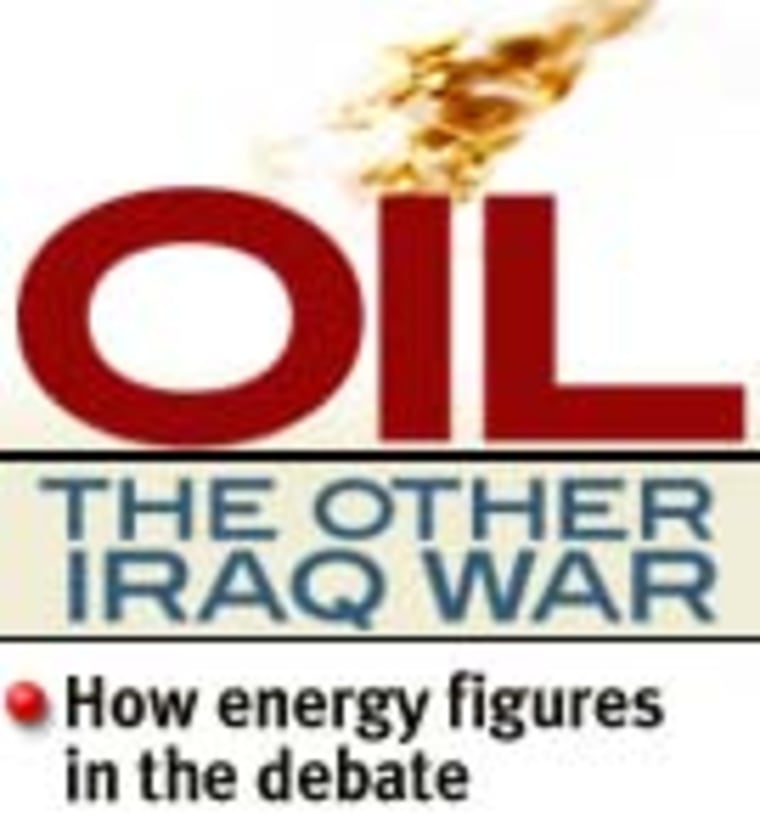Millions of barrels of Iraqi oil that could be used to pay for humanitarian aid are sitting in oil tankers and storage tanks in the Turkish port of Ceyhan — essentially stuck in limbo. Until the question of who controls Iraqi oil is settled, dealers are reluctant to sign contracts to buy it — even if they could get through on the phone to Iraqi oil officials in Baghdad. The good news is that, once the smoke clears, Iraqi oil could begin flowing again soon.

THOUGH MANY IRAQI oil fields have been largely secured undamaged by U.S. and British forces, with the war raging a host of political and logistical issues have stopped the flow of Iraq’s oil — most likely until the shooting stops. And with oil sales shut down, humanitarian groups are scrambling to replace the revenue generated by U.N.’s oil-for-food program, which was suspended when U.N. monitors left Iraq shortly before the war began.
“There’s no institutional arrangement now to sell (Iraqi oil),” said Ed Porter, head of research at the American Petroleum Institute. “The U.N. was in charge of those sales and their personnel are gone now, and the U.S. hasn’t really stepped in.”
Under the U.N. program, proceeds of Iraqi oil sales were supposed to be used to buy food and medical supplies for the Iraqi people. Though Saddam Hussein allegedly skimmed some of that money to support the Iraqi military, more than 60 percent of the 26 million Iraqi people depend solely on the program for food, according to U.N. estimates.
Oil continues to flow from the Kirkuk region, deep in the northern no-fly zone, which has so far escaped war damage. Shipments through a pipeline to the Turkish port of Ceyhan have slowed in recent days because, with oil sales halted, storage facilities at the terminal are full to capacity of about 6.5 million barrels. Another 20 million barrels of Iraqi oil already loaded on tankers that have not yet been sold. (Iraq’s southern oilfield in Ramaila, which suffered relatively modest damage in the early days of the war, will take three months and $1 billion in repairs to get back up to speed, the commander of British forces in the Gulf said Thursday.)
Resumption of oil sales will be critical to providing humanitarian aid and funds for rebuilding. [Late Thursday, the Security Council reached agreement on adjusting the oil-for-food plan. A vote is scheduled for Friday. More than $2.5 billion earmarked for food is currently in the program, but some security council members have reservations about approving new resolutions concerning postwar Iraq, fearing they would legitimize the U.S. and British use of force.]
Last year, Iraqi oil exports brought in $12.3 billion, including about $3 billion in smuggling, according to U.S. Energy Department estimates. And oil exports make up 95 percent or more of Iraq’s export revenues.
FOOD FIGHT

With the oil-for-food program frozen, the U.N. is scrambling to come up with alternative way of paying for $2 billion in immediate relief to head off widespread starvation in Iraq. The plan is mired in a debate over whether the U.S. and Britain, having embarked on war without U.N. approval, should pick up the tab alone for the cost of relief and rebuilding.
But money may not be the real issue. There’s more than enough money sitting in a U.N. account to pay for a crash relief program left over from past Iraqi oil sales — as much as $12.9 billion, according to David L. Phillips, a member of a Council on Foreign Relations task force that recently looked at the rebuilding of Iraq after the war.
“The U.N. is obfuscating that number because they don’t want to appear as though they’re sitting on a huge stash of cash while the Iraq people are suffering,” he said.
Politics is a more likely culprit. With the U.N. still deeply split over the U.S. decision to go to war, the major players are also bogged down by a larger debate over who will control the rebuilding of Iraq.

The battle over lucrative rebuilding contracts has already broken out on several fronts. U.S. wireless phone companies are lobbying heavily to see that the U.S.—based cellphone technology, known as CDMA, edges out a European standard known as GSM in the rebuilding of the Iraqi communications networks. American farmers, barred from selling wheat by the Iraqi regime, are hoping to win a major piece of the billions in wheat sales needed to feed the war-torn country. Under the oil-for-food program, most of that wheat came from Australia, France and India.
But the biggest prize, by far, will be the contracts to rebuild and develop Iraq’s vast oil resources, which some analysts believe could eventually rival Saudi Arabia as the world’s biggest source of oil. Though the country’s badly neglected oil infrastructure now produces a fraction of global supplies, much of its potential reserves remain unexplored.
France and Russia maintain they already have multi-billion dollar contracts to develop Iraq’s oil fields. Russia’s energy minister on Thursday continued to defend his country’s oil interests in Iraq, saying it would insist that Russian oil company contracts with Baghdad be honored after the shooting stops.
But some in the oil industry say those contracts were not valid under U.N. sanctions, and Iraqis in exile have said they would void contracts once the current regime is ousted. French and Russian opposition to the war was due, in large part, to fears that a U.S.-led military campaign would position U.S. oil companies to lead the rebuilding effort. Now, that scenario looks likely unless a new Iraqi regime can be established quickly, according to James Placke, an analyst at Cambridge Energy Research Associates.
“I can imagine (the French) will be all over the Iraqis as soon as there are Iraqis to be all over,” he said. “But you can’t wait two years to make these decisions.”
The Bush administration has another strong motivation to rebuild the Iraqi oil industry quickly. The White House has said the U.S.-led war is designed to liberate untapped Iraqi oil to provide billions of dollars for the Iraqi people to rebuild their country. But some oil traders believe that vastly increasing Iraqi oil production will blunt the impact of OPEC’s control of oil prices and promote cheaper oil supplies for years to come.

“Now you’re going to have a new big player on the block that could potentially change the way oil is priced on world markets,” said Phil Flynn, an oil trader with Alaron Trading.
But it remains to be seen just how quickly Iraqi oil production can be increased. Phillips believes that once the war is over and the overhaul of Iraq’s oil wells and pipelines begins, production could rise by half a million barrels a day each year. That would put Iraqi production at 5 million barrels per day by the end of the decade — about half of Saudi Arabia’s current capacity.